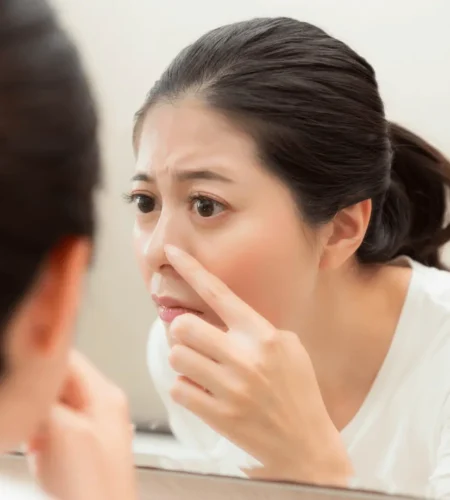Pregnancy is a beautiful journey, but it often comes with a host of changes, including hormonal fluctuations that can wreak havoc on your skin. Many expectant mothers experience pregnancy acne and blemishes, which can be frustrating. The good news is that there are safe and effective ways to manage and even prevent these skin issues during this special time. In this comprehensive guide, we’ll explore the causes of breakouts in pregnancy, share tips for managing it, and recommend safe skincare practices to keep your skin clear and glowing throughout your pregnancy.
Table of Contents
Understanding Pregnancy Acne
Pregnancy acne, also known as “pregnancy-related acne” or “gestational acne,” is a common skin issue that affects many pregnant women. It can manifest as:
- Blackheads: Clogged hair follicles with open pores.
- Whiteheads: Clogged hair follicles with closed pores.
- Papules: Small red bumps.
- Pustules: Pimples with pus at the tips.
- Cysts: Painful, large, deep lumps under the skin.
What Causes Pregnancy Acne?

Pregnancy acne occurs primarily due to hormonal changes, specifically the increase in hormone levels such as progesterone and androgens. These hormonal shifts stimulate the sebaceous glands to produce more oil, which, when combined with dead skin cells and bacteria, can lead to acne breakouts.
Other factors that contribute to pregnancy acne include:
- Genetics: If you have a family history of acne, you may be more prone to developing it during pregnancy.
- Stress: Pregnancy itself can be a stressful time, which can exacerbate acne.
- Diet: Consuming a diet high in sugary and processed foods can worsen acne.
- Skincare Products: Using non-pregnancy-safe skincare products can trigger or worsen acne.
Tips for Managing Pregnancy Acne and Blemishes
Managing pregnancy acne requires a holistic approach that focuses on safe and gentle skincare practices, lifestyle adjustments, and, when necessary, treatments recommended by your healthcare provider. Here are some effective tips for managing pregnancy-related acne:
1. Follow a Gentle Skincare Routine:
- Cleansing: Use a gentle, sulfate-free cleanser to wash your face twice a day to remove dirt and oil without over-drying your skin.
- Avoid Over-Exfoliating: Limit exfoliation to 1-2 times per week and choose mild exfoliants with ingredients like glycolic acid or lactic acid.
- Moisturize: Use a pregnancy-safe, non-comedogenic moisturizer to keep your skin hydrated.
2. Choose Pregnancy-Safe Skincare Products:
- Check Ingredients: Look for skincare products that are free of retinoids, salicylic acid, and benzoyl peroxide, which are considered unsafe during pregnancy.
- Hypoallergenic: Opt for hypoallergenic and fragrance-free products to reduce the risk of skin irritation.
3. Hands Off:**
Avoid touching your face or picking at blemishes, as this can introduce bacteria and worsen acne.
4. Sun Protection:

Use sunscreen with at least SPF 30 daily to protect your skin from sun damage, which can worsen pigmentation issues.
5. Balanced Diet:
Consume a balanced diet rich in fruits, vegetables, whole grains, and lean proteins. Avoid excessive sugar and processed foods.
6. Stay Hydrated:
Drink plenty of water to keep your skin hydrated from the inside out.
7. Stress Reduction:
Practice stress-reduction techniques such as deep breathing, meditation, or prenatal yoga to manage stress, which can trigger acne.
8. Pregnancy-Safe Acne Treatments:
Consult your healthcare provider or dermatologist before using any acne treatments. Some pregnancy-safe options include:
- Topical Antibiotics: Erythromycin or clindamycin may be prescribed to manage acne.
- Azelaic Acid: A topical cream containing azelaic acid can help reduce inflammation and improve skin texture.
- Sulfur-Based Products: Sulfur-based spot treatments can be effective for mild acne.
- Topical Benzoyl Peroxide: In lower concentrations (2.5% or less), benzoyl peroxide may be considered safe for short-term use.
9. Maintain a Clean Environment:
Wash your pillowcases and sheets regularly to prevent bacteria buildup that can transfer to your skin.
10. Consult a Dermatologist:
If your acne is severe or persistent, consult a dermatologist who can provide tailored treatment options that are safe during pregnancy.

Safe Skincare Ingredients for Pregnancy
When choosing skincare products during pregnancy, look for the following safe and beneficial ingredients:
1. Glycolic Acid:
A gentle exfoliant that can help improve skin texture and reduce blemishes.
2. Lactic Acid:
An alpha hydroxy acid (AHA) that exfoliates and hydrates the skin.
3. Hyaluronic Acid:
A hydrating ingredient that can help alleviate dryness and maintain skin elasticity.
4. Niacinamide (Vitamin B3):
Reduces inflammation, regulates oil production, and enhances skin barrier function.
5. Green Tea Extract:
An antioxidant that can soothe and reduce inflammation in the skin.
6. Aloe Vera:
Known for its soothing properties, aloe vera can help calm irritated skin.
Lifestyle Changes for Healthy Skin During Pregnancy

In addition to skincare and skincare products, certain lifestyle changes can help improve the health of your skin during pregnancy:
1. Diet:
- Eat a balanced diet rich in vitamins and minerals, especially vitamin C and vitamin E, which are beneficial for the skin.
2. Hydration:
- Drink plenty of water to keep your skin hydrated from the inside out.
3. Sleep:
- Aim for adequate sleep to allow your skin to regenerate and heal.
4. Stress Management:
- Practice stress-reduction techniques such as meditation, deep breathing, or mindfulness to prevent stress-induced acne flare-ups.
5. Exercise:
- Engage in regular, gentle exercise to improve circulation and promote healthy skin.
Conclusion: Embrace Your Pregnancy Glow
Pregnancy acne and blemishes can be challenging, but with the right skincare routine, lifestyle adjustments, and the guidance of healthcare providers or dermatologists, you can effectively manage them and maintain clear and radiant skin during this special time. Remember that every pregnancy is unique, and what works for one person may not work for another, so consult with professionals who can provide personalized advice. Embrace your pregnancy glow and enjoy this beautiful journey to motherhood.




Comments